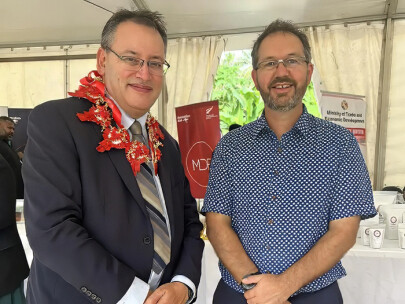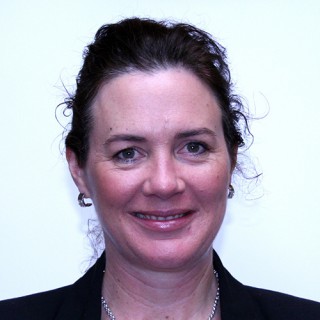
Hon. Dr Shane Reti and soil scientist Dr Sam Carrick during CALM.
A first initiative under the CALM programme followed in May 2025, with soil and plant scientists from Manaaki Whenua travelling to Tonga to take part in the 4th Pacific Week of Agriculture and Forestry (PWAF), supporting a vital regional collaborative push toward more resilient, inclusive, and climate smart agriculture across the Pacific.
The week included a Regional Research Symposium, hosted by the Pacific Community (SPC), which drew researchers from across the Pacific to share their work on themes such as soil degradation, crop protection, and the intersection of indigenous knowledge and innovation. Whether the focus was on cacao, kava, or climate-ready crops, the message was clear: localised science must underpin regional transformation. Our team contributed two key presentations. Caroline Mitchell presented on taro genetic characterisation – part of an effort to improve germplasm management at the Centre for Pacific Crops and Trees (CePaCT) – and Dr Ana Podolyan shared our work on taro virus indexing, a crucial step toward securing healthy CePaCT planting material for the region.
Our team also participated in the Mainstreaming of Rural Development Innovation (MORDI) Tonga Trust event – an example of community- led innovation. MORDI distributes hundreds of plants, free of charge, to rural women across Tonga, creating both food security and financial opportunity. Women in Tonga, and across the Pacific, face systemic barriers in land ownership, market access, and technical training. Yet, they are also the heartbeat of agricultural resilience.
The event enabled open dialogue between researchers and community developers, bridging the gap between science and on-the-ground action.
Manaaki Whenua’s Jane Lattimore assisted in facilitating this process, helping co-design a framework to ensure research doesn’t just end in reports but grows into tangible, equitable change. MORDI shows what’s possible when those most often excluded are instead empowered.
Hosted by the Government of Tonga, the SPC and the FAO, PWAF aimed to address key challenges and innovations in Pacific food and forestry systems. Dr Sam Carrick co-hosted a Pacific Soils Partnership session, working on a Pacific work plan for soil analysis and sustainable soil management. The workplan aims to coordinate resources and projects, strengthening regional collaboration and knowledge sharing to address persistent gaps and barriers for soil health management across the Pacific. Dr Thomas Caspari showcased the Pacific Soil Portal website, which has made soil and crop suitability information readily available for six Pacific countries. PWAF also included the 10th regional meeting of Pacific Heads of Agriculture and Forestry Services, at which New Zealand is officially represented by MPI and by donor representation from MFAT.
There was also time for a visit to the Vaini Research Station, operated by Tonga’s Ministry of Agriculture, Food, and Forestry (MAFF), which highlighted the station’s efforts to build capacity in soil testing, plant health diagnostics, and the establishment of a tissue culture collection for key crops. Manaaki Whenua can offer future targeted support in these areas, particularly to strengthen diagnostic services and laboratory infrastructure, and improve record-keeping for the station’s herbarium and insect collections.

